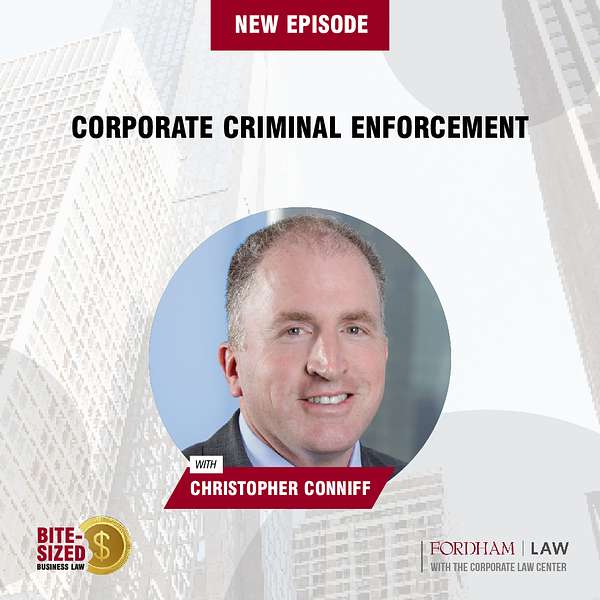
Bite-Sized Business Law
Looking for the latest in legal business news?
Get a breakdown of the top stories in business law from industry leaders on the front lines with Bite-Sized Business Law. Host Amy Martella takes a closer look at the latest corporate happenings through interviews with the attorneys, legal experts, public figures, and scholars behind the news to distill business law’s biggest stories into bite-sized portions.
This is your chance to go further into the world of business law and stay up to date with legal cases and industry trends.
Corporations impact us all, leading changes that extend far beyond business to shape the economy, public policy, technology, and beyond. Looking at the big picture, Amy discusses not only the underlying issues in business ethics and legal cases leading the biggest stories but also sparks thought-provoking discussions on where the law should be headed.
Amy is the Executive Director of the Corporate Law Center at Fordham University School of Law. Her background ranges from big law to government to tech startups, allowing her to offer an insider’s perspective of the issues that shape corporate actions, large and small. Covering crypto regulation to securities fraud, AI’s impact to Elon Musk’s pay package, Bite-Sized Business Law covers it all with guests of varying viewpoints to provide the nuanced analysis needed to tackle complex problems.
Whether you're looking for the latest in legal insight on intellectual property, mergers and acquisitions, business ethics or legal cases in the business law world, you’ll find it here. Enjoying a thoughtful perspective on the news stories of the moment, Bite-Sized Business Law examines big issues and delivers them in small doses.
Bite-Sized Business Law is a project by the Corporate Law Center at Fordham Law. The Center serves as a hub for scholars, professionals, policymakers, and students to engage in the study, discussion, and debate of current issues in corporate law. The Center focuses on aspects of corporate law, corporate compliance, antitrust law, and securities regulation. Through initiatives like the Mergers and Acquisitions seminar and the Securities Litigation and Arbitration Clinic, students actively engage in real-world research and cases, bridging the gap between classroom learning and practical application in the legal field.
Bite-Sized Business Law
Christopher Conniff on Corporate Criminal Enforcement
Use Left/Right to seek, Home/End to jump to start or end. Hold shift to jump forward or backward.
At the 38th American Bar Association National Institute on White Collar Crime, Deputy Attorney General Lisa Monaco remarked that the DOJ will “zealously pursue corporate crime” and “hold wrongdoers accountable, no matter how prominent or powerful they are.” With this, the DOJ ushered in policy changes in prosecuting corporate crime, and today Christopher Conniff joins us to explain these changes. Chris is an experienced trial lawyer and partner at Ropes & Gray where he co-leads the Securities and Futures Enforcement Group. His practice focuses on white-collar criminal defense and securities regulation and he helps his clients navigate investigations in a wide array of areas, from public corruption to criminal antitrust and everything in between. Join us as we unpack some of the new policies to prosecute corporate crime, why the DOJ has put compliance (not punishment) at the heart of these policies, and how companies of all shapes and sizes should respond to them. Does the old adage “an ounce of prevention is worth a pound of cure” ring true? Tune in today to find out!
Key Points From This Episode:
- Some quintessential examples of corporate white-collar crime.
- A look at Chris’ professional background and his work at the US Attorneys' Office.
- Insight into the traditional regime for prosecuting corporate crime.
- Chris’s take on the DOJ’s pilot program regarding compensation incentives and clawbacks.
- The challenge with “box checking” and artificial incentives.
- Why corporate responsibility is the focus of the DOJ, not punishment.
- Subpoena compliance versus cooperation with it comes to good corporate citizenship.
- How these policy changes confront a historical lack of trust in the government.
- Practical implications of the new DOJ criminal self-disclosure policies.
- Why facts and transparency are critical when the cost of an investigation is a challenge.
- What corporations need to be aware of regarding the use of personal devices.
- How corporations should react to this new set of incentives.
- Why Chris is optimistic about the efficacy of this program.
Links Mentioned in Today’s Episode: